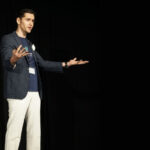
In the last weeks, clients have asked me, “What were people thinking when they voted for Trump? My answer has been some form of: “They weren’t thinking, they were feeling. If a person doesn’t feel safe, they are less likely to be able to think – so they take a stab in the dark.”
They did and now we shall see.
The Mourning After the Election
Many agree with David Remnick, editor of the New Yorker, who said in his Nov. 13th online comment: “(Trump’s) level of egotism is rarely exhibited outside of the clinical environment.”
- Few voters are aware of recent research showing roughly 20% of CEO’s are psychopaths – the same rate found in the prison population.
- US Emory University researcher Scott Lilienfeld found that psychopaths are over-represented in the fields of politics, business, and high-risk sport. UK Oxford psychologist Kevin Dutton’s research showed that CEO’s, lawyers, TV/Radio media, salespeople and surgeons are the professions with the highest number of psychopaths.
How does a psychopath behave?
Nottingham Trent University researcher Clive Boddy (2011) outlines corporate psychopath’s behavior as follows:
- (they) lack concern for the feelings of others, fail to experience guilt, and can engage in actions that put others at risk;
- they can be charming and manipulative, which allows them to gain entry to the executive suite;
- they appear to make decisions easily and coolly, which can impress others around them; and
- (they) “cheerfully lie about their involvement in events, are very persuasive in blaming others for what has happened and have no doubts about their own continued worth and value.
Trump may be a psychopath, but he is smart as a fox
Regardless of Trump’s mental health, he is an A+ student of the sciences of psychology and perception. He understands the difference between appealing to conscious reason vs. unconscious emotion.
(Note: The conscious mind is the part of your mind that calculates and analyzes. It handles approximately 5% of your brain function, and is the seat of your willpower—the part you assign to keep New Year’s resolutions that usually fail. The unconscious handles the remaining 95% and its sole purpose is to keep you safe, which also means coordinating your organ function.)
Trump knows we are formed by what brings us to laughter and tears.
Trump knows that:
- cultivating followers depends upon rallying emotion not reason;
- when the going gets tough, the tough get emotional;
- if a voter feels threatened and gets emotional, the unconscious votes.
He also knows that:
- the unheard, afraid, brokenhearted and left-behind can’t listen to detail; and
- fear is not gender specific. (An “educated” woman doesn’t have to live in the rust belt to remember the fear she felt during the dotcom bust, and the Great Recession with job loss, the stock market crash, and underwater mortgages. Add in school shootings, and it-can-happen-anywhere terrorism and you have a fearful voter.)
We who work in the field of psychology understood that
- the electorate was more afraid than offended;
- a “whiff” of feeling safe intoxicated voters; and
- when the Republicans renounced Trump, they helped him win. (They hadn’t cared about the unemployed and desperate in decades!)
And yet I must admit, as much as I understand it, I was stunned to see how well it worked. I am a true independent, and I wasn’t a fan of Hillary’s, but I was stunned.
And yes I know that Hillary won the popular vote. But this post is not about Clinton.
Trump’s campaign and the American myth of the lone cowboy
Decades ago I attended a UC presentation on The American Myth by philosophy professor Jacob Needleman. The subject was specifically about the myth on which our country was founded. I couldn’t help but think of Needleman’s theory while watching the recent campaign.
Needleman’s concept of The American Myth was based on the lone cowboy. During the presentation, he showed film of the old formulaic TV westerns that were ubiquitous in the 40’s and 50’s. And the story line was always the same.
An Alan-Ladd-type cowboy rides slowly into a small dusty western town. Locals on the sidewalks smell trouble and stop in their tracks as he passes.
As the cowboy makes his way to the saloon he locks eyes with a pretty bonneted-women who self-consciously drops her gaze and pulls her two children behind her full-length skirt.
The lone cowboy dismounts in front of the saloon, secures his horse to the hitching post, and enters. Inside, all talk stops. You can cut the communal fear with a knife.
Sure enough, it isn’t long until the lone cowboy causes trouble and a fight breaks out. Within minutes the sheriff enters with his gun pulled. Grabbing the cowboy by the shirt, he shoves the barrel under his chin and orders him to be out of town by sun up—or else.
Between the time of the ultimatum and sunrise, the gunslinger steps into another hornet’s nest and saves the life of the husband of the woman he had quietly flirted with earlier on the street.
The next morning, on schedule, the lone cowboy mounts his horse and slowly heads out of town, detouring to climb a nearby bluff. Reins in hand, arms folded, he leans over the saddle’s horn to see the pretty woman hanging her wet clothes on the line below. She looks up wistfully as he turns his horse and disappears.
The moral of the story: The man the townspeople thought was dangerous proved he could be decent. He had saved the woman from being widowed and losing her family farm.
But there is one thing we can’t assume about the lone cowboy: Would he have been consistently decent if he had stayed for four years or was he basically a consummate con man?
With that question in mind, we have one clue from his book, The Art of the Deal, that signals Trump understands thin ice:
“You can’t con people, at least not for long. You can create excitement, you can do wonderful promotion and get all kinds of press, and you can throw in a little hyperbole. But if you don’t deliver the goods, people will eventually catch on.”
We will soon find out what Trump delivers. Let’s hope he delivers more than hate.
Until then… life has always been about chop wood, carry water—and it will continue to be. Our work is never done and to that end, chop, carry and take to heart what the philosopher Seneca offers: “the whole future lies in uncertainty: so live immediately.”
*Einstein’s full quote: “Science in my generation has become like a razor blade in the hands of a 3-year-old.”
If you want to access free audios by Vicki to quell your anxiety, deal with your grief, find sleep or just become motivated, go to her YouTube Channel, ComfortCareConnection.
If you liked this post, please forward! Thanks!
Subscribe to Blog































